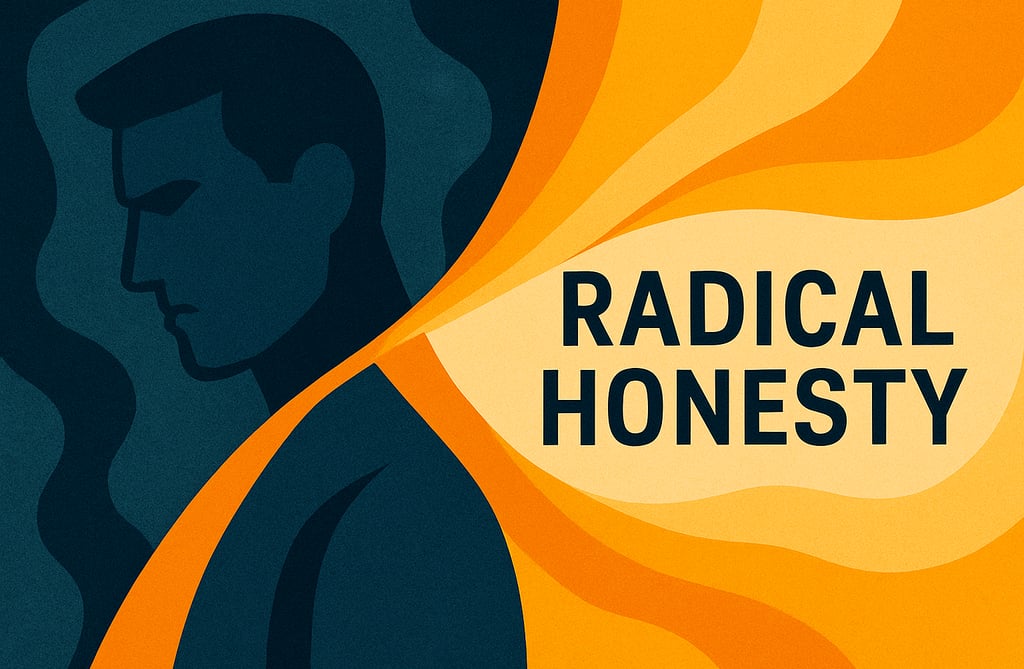Still Telling the Truth, Even When It Hurts (Me)
I’ve had this on my mind for a while. Just some thoughts that have been simmering beneath the surface and finally needed a place to land. It’s part honesty, part oversharing, part post-cult introspection. A little more serious than most “showerthoughts,” maybe, but it’s really just a few of them crammed together: Why do I still feel the need to be radically transparent? Why do I spiral after being honest? And why does that old JW fear of “stumbling someone” still haunt me, even now? I wanted to explore all that — and give myself permission to keep learning through it.
SHOWERTHOUGHTS
Oliver
5/17/20254 min read


There’s a particular kind of emotional hangover that hits me after certain conversations. I’ll walk away and feel... off. Heavy. Sometimes angry, sometimes embarrassed, sometimes just hollow and confused.
It’s not always because something bad was said. It’s not even always a conflict. But if I spoke my mind — even gently, even kindly — some part of me starts to spiral.
Did I say too much?
Did I make them uncomfortable?
Why do I always feel like crap after these conversations?
It took me a while to realize what was happening. But eventually I recognized the ghost in the room: my Jehovah’s Witness programming. More specifically, the deeply ingrained tension between honesty and not stumbling others.
Radical Honesty, but Only Within the Lines
As a JW, I was raised to be honest. Like, radically honest. We weren’t just discouraged from lying — we were conditioned to confess. To report. To be transparent to a fault. “Jehovah sees everything,” we were told. So there was no point hiding.
Integrity wasn’t just a virtue — it was a spiritual lifeline.
But at the same time, we were also taught something else: that being too unfiltered — too real — could backfire. Especially if it stumbled someone else. The fear of “stumbling” others was everywhere. A stray comment, an honest question, a misinterpreted action — any of it could supposedly cause someone to lose their faith. And if that happened? It was your fault. You carried the guilt.
The result? A weird inner conflict where you had to appear honest and transparent, while constantly filtering what you said to protect other people’s perception. And if your truth didn’t serve “theocratic unity”? You were better off staying quiet.
So What Happens When You Wake Up?
When I started waking up — really waking up — from that mindset, I still carried that intense drive to be honest. It felt wrong to pretend. Wrong to hide. I knew who I was, what I believed (or didn’t), and I didn’t want to build a new life based on a lie.
So I started being open. Not recklessly so, but real. Honest with friends. Transparent in conversations. Trying to show up as me, even when I knew it might stir discomfort.
But the programming didn’t disappear just because my beliefs did.
I’d have a conversation with someone close to me, express something true... and then spiral for hours afterward. I’d feel guilty. I’d wonder if I “pushed too hard.” I’d worry I had stumbled them — yes, that exact word still haunted me.
It’s wild how the same people who once praised my honesty — when it served the organization — suddenly saw it as a threat the moment it served me.
Honesty Isn’t the Problem. Fear Is.
Here’s what I’ve been learning, slowly and painfully:
Honesty isn’t dangerous.
What’s dangerous is when honesty is only allowed in one direction.You’re not responsible for managing everyone else’s emotional reactions.
Especially if doing so means denying your own truth.Not every post — conversation spiral is a sign you did something wrong.
Sometimes it’s just your nervous system trying to unlearn years of spiritual gaslighting.
And maybe most importantly:
There’s a difference between being honest and oversharing.
I can tell the truth without handing someone my whole inner world wrapped in a bow.
Boundaries aren’t dishonesty. They’re wisdom.
The Fear of Stumbling Is Still There... But I’m Not Letting It Drive
I still feel it sometimes. That pang in my gut when I say something bold. That mental checklist of who might be hurt, confused, or shaken by my words. The voice that whispers, What if this makes someone doubt? What if you push them away?
But I’m learning to answer that voice now:
If my honesty causes discomfort, that doesn’t make it wrong.
If my transparency shakes someone’s assumptions, maybe that’s okay.
If I’m being real with love, then I’m not stumbling anyone — I’m just walking forward.
I think part of why I still hesitate, especially around close friends, is because I’m not trying to wake people up just for the sake of it. I’ve seen what happens when one person wakes up and the other doesn’t. I’ve seen families break apart. Marriages end. Parents and children turn into strangers. That’s not what I want. I don’t want to blow up someone’s life — I just want people to have all the information. To be able to make informed decisions, whatever they end up choosing. So yeah, I tread lightly. I hold back. And maybe that’s why I started this blog. At least here, I can speak. I can tell the truth in my own words, in my own space. And if someone’s ready, they’ll find it. I’m not out to destroy faith — I’m just trying to make space for honesty.
I didn’t leave a high — control religion just to build a new cage out of silence.
So yes — I still tell the truth. It’s part of who I am. But I do it now with more care for myself, too. I pause. I breathe. I choose my moments. And I no longer believe that honesty is only valid if it keeps everyone else comfortable.
Sometimes telling the truth will cost you something. But hiding it? That always costs you everything.
And yet, reading this back now — all of it still feels very familiar. These aren’t just old habits I broke free from; they were part of how I functioned for years. I acted in ways I didn’t always believe in. I said things I didn’t fully agree with. But when you’re in a system like that, it’s like being on autopilot. You perform the expected version of yourself, even when the real version is buried under doubt. Looking back, I have to be honest — with myself now — and admit that even when I didn’t believe, I still played along. Not because I lacked integrity, but because I thought I had no choice. I thought I was protecting others. I thought it was the right thing to do.
Maybe that’s why I value honesty so much now. Because I know what it’s like to live without it.
